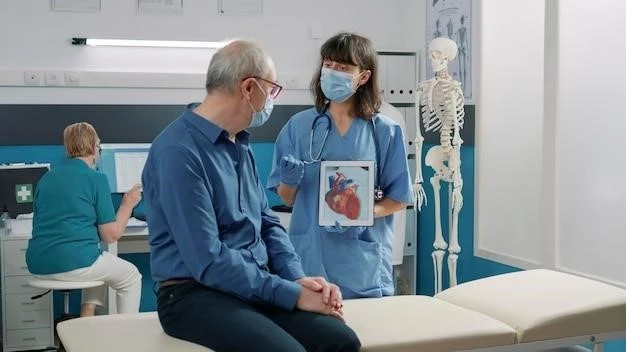Causes of Aortic Arches Defect
Understanding the causes of aortic arches defects can help in prevention and early detection.
Genetic Factors
Genetic factors play a significant role in the development of aortic arches defects. Individuals with a family history of heart abnormalities may have a higher risk. It is advisable to consult with a genetic counselor to understand inherited risks and potential preventive measures.
Environmental Triggers
Exposure to certain environmental factors during pregnancy‚ such as toxins‚ infections‚ or maternal health issues‚ can contribute to aortic arches defects in infants. It’s essential for expectant mothers to maintain a healthy lifestyle and avoid harmful substances to reduce the risk of these defects.
Symptoms and Diagnosis of Aortic Arches Defect
Recognizing symptoms and undergoing diagnostic tests promptly is crucial for effective treatment.
Common Symptoms
Common symptoms of aortic arches defects include difficulty breathing‚ bluish skin‚ poor feeding‚ and abnormal heart sounds. If you notice these signs in yourself or a loved one‚ seek immediate medical attention for a thorough evaluation and diagnosis.
Diagnostic Procedures
Diagnostic procedures for aortic arches defects may include echocardiograms‚ MRIs‚ CT scans‚ and cardiac catheterization. These tests help in confirming the diagnosis and determining the severity of the defect. It is essential to follow the healthcare provider’s recommendations for accurate results and appropriate treatment planning.
Treatment Options for Aortic Arches Defect
Exploring treatment options with healthcare providers is crucial for managing aortic arches defects.
Medication
Medication may be prescribed to manage symptoms and improve heart function in individuals with aortic arches defects. It is essential to follow the treatment plan recommended by healthcare providers and attend regular follow-up appointments for monitoring and adjustments as needed.
Surgical Interventions
Surgical interventions‚ such as repair or reconstruction of the aortic arch‚ may be necessary for severe cases of aortic arches defects. It is crucial to discuss potential surgical options with a specialized healthcare team to determine the most suitable approach for optimal outcomes and recovery.
Complications Associated with Aortic Arches Defect
Understanding potential complications is vital for managing aortic arches defects effectively.
Cardiovascular Complications
Cardiovascular complications associated with aortic arches defects can include high blood pressure‚ heart failure‚ and arrhythmias. It is crucial to monitor heart health regularly‚ adhere to treatment plans‚ and make lifestyle modifications as advised by healthcare professionals to prevent or manage these complications effectively.
Neurological Complications
Neurological complications from aortic arches defects may lead to stroke‚ cognitive impairment‚ or developmental delays. It is essential to monitor for any neurological symptoms‚ follow up with healthcare providers regularly‚ and seek appropriate interventions to address these complications promptly and effectively.

Prevention Strategies for Aortic Arches Defect
Implementing prevention strategies can help reduce the risk of aortic arches defects.
Prenatal Care
Attending regular prenatal check-ups‚ following a healthy diet‚ avoiding harmful substances‚ and discussing any family history of heart defects with healthcare providers are essential steps in prenatal care to promote the well-being of both the mother and the baby and potentially reduce the risk of aortic arches defects.
Healthy Lifestyle Choices
Engaging in regular physical activity‚ maintaining a balanced diet‚ avoiding tobacco and excessive alcohol consumption‚ managing stress levels‚ and getting an adequate amount of sleep are all essential components of a healthy lifestyle that can contribute to overall heart health and lower the risk of aortic arches defects. Making these choices supports long-term well-being.
Research Advances in Aortic Arches Defect
Staying informed about the latest research can provide insight into innovative approaches for managing aortic arches defects.
Genetic Studies
Advancements in genetic studies are helping researchers uncover the underlying genetic factors contributing to aortic arches defects. Participation in genetic research studies can lead to a better understanding of the condition and potentially pave the way for more personalized and targeted treatment approaches in the future.
Innovative Treatments
Researchers are exploring innovative treatments such as gene therapy‚ stem cell therapy‚ and advancements in surgical techniques to address aortic arches defects. Staying informed about these developments and discussing potential options with healthcare providers can offer new hope and possibilities for individuals affected by this condition.
Living with Aortic Arches Defect⁚ Tips and Recommendations
Implementing lifestyle adjustments and seeking support can enhance the quality of life with aortic arches defects.
Regular Follow-Ups
Consistent follow-up appointments with healthcare providers are crucial for monitoring heart health‚ reviewing treatment effectiveness‚ and addressing any new symptoms. Keeping a record of medications‚ symptoms‚ and questions can help optimize each visit and ensure comprehensive care for managing aortic arches defects.
Support Networks
Connecting with support networks‚ such as patient advocacy groups or counseling services‚ can provide emotional support‚ helpful resources‚ and a sense of community for individuals living with aortic arches defects. Sharing experiences and learning from others facing similar challenges can offer valuable insights and encouragement along the journey.
Aortic Arches Defect in Infants and Children
Early intervention and specialized care are essential for managing aortic arches defects in young patients.
Early Intervention
Timely intervention‚ including close monitoring‚ medical treatments‚ and potential surgical interventions‚ is crucial for improving outcomes in infants and children with aortic arches defects. Collaborating with a multidisciplinary medical team specialized in pediatric cardiology can provide comprehensive care and support for young patients.
Pediatric Treatment Approaches
Pediatric treatment approaches for aortic arches defects may involve a combination of medications‚ close monitoring‚ catheter-based interventions‚ or corrective surgeries‚ depending on the severity of the condition. Working closely with pediatric cardiologists and cardiac surgeons can help tailor treatment plans to meet the specific needs of infants and children with aortic arches defects.
